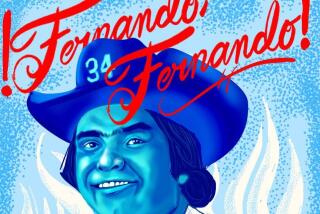An Engaging Tribute to Perry Como
- Share via
Despite the impact of Elvis Presley and the rock revolution in the second half of the ‘50s, traditional pop singers--from Nat (King) Cole to Frank Sinatra--remained major sales forces in pop music during that period.
Of them, Perry Como--the former barber from Pennsylvania who sang in a relaxed crooning style that was greatly influenced by Bing Crosby and Russ Columbo--was the hottest on the charts.
The hits from the late ‘50s were just part of a remarkable string that began with “Goodbye, Sue,” his first RCA single in 1943, and lasted into the ‘70s, when he made it onto the charts with such songs as Don McLean’s “And I Love You So.”
Among Como’s signature singles: “Till the End of Time,” which spent 10 weeks at No. 1 in 1945; “If,” which was No. 1 for eight weeks in 1951, and “It’s Impossible,” which reached No. 10 on the charts in 1970.
Those recordings are among the 71 selections contained in “Perry Como: Yesterday and Today--A Celebration in Song,” a three-disc boxed set from RCA that contains four previously unreleased tracks and a colorful 74-page booklet with an essay by rock historian Colin Escott about the singer’s colorful career.
As the music here shows, Como was a man of considerable vocal ability, but he was, perhaps intentionally, a modest stylist. When Sinatra recorded a song by, say Cole Porter, the challenge for him, one sensed, was to come up with an interpretation that was all his own. He aimed for phrasing that surprised and delighted.
For Como, the challenge appears to have been quite different. When he approached a song--including Porter’s “I Concentrate on You” and “Begin the Beguine,” both of which are included in the set--the goal was to sing it in an everyman way that enabled you to sing along effortlessly.
It’s this relaxed style--which also carried over into his manner and public persona--that made Como such a TV favorite.
If that television exposure contributed greatly in the ‘50s to Como’s continued popularity, he also benefited from a willingness to sing material that was in keeping with the commercial trends of the day--even if that material sometimes made him wince.
As Escott writes in his liner notes, Como--who was born in 1912, nine years after his parents arrived in the United States from Italy--is quick to acknowledge that many of the songs that became big hits were ones he didn’t want to record. “I’d tell the A&R; man, ‘I can’t sing that garbage,’ and he’d say, ‘Just do one take--one take for me.’ I’d say, ‘I’m gonna get ill if I do two.’ ”
Escott identifies an ersatz polka called “Hoop-Dee-Doo” as the first song Como hated to record, but it went to No. 1 in 1950--and one can imagine Como frowning later over such novelties as the rock-flavored “Hot Diggity (Dog Ziggity Boom)” and the horribly corny “Wild Horses.”
There are some curious omissions in the set, including “Wanted,” which was No. 1 for eight weeks in 1954. Mostly, however, the set is an engaging tribute to a singer who for more than a quarter century made singing along an invitation that few pop fans could resist.
More to Read
The biggest entertainment stories
Get our big stories about Hollywood, film, television, music, arts, culture and more right in your inbox as soon as they publish.
You may occasionally receive promotional content from the Los Angeles Times.










